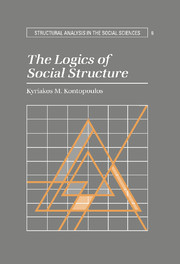Part I - Metatheoretical considerations
Published online by Cambridge University Press: 24 October 2009
Summary
Part I focuses on the recent developments in many scientific fields (physics, biochemistry, population ecology, neuroscience) where there has been a dramatic shift away from the dogmatic reductionist epistemic strategy and toward a dynamic and emergentist conceptualization of various kinds of phenomena along new – constructionist, heterarchical, and hierarchical – lines of thought. This informal introduction to current scientific issues and debates, prior to any consideration of the already available sociological approaches, will help us, I believe, to see the problem of social structure in a new light.
There are four chapters in this part and they address the following issues: the five basic epistemic strategies of reductionism, constructionism, heterarchy, hierarchy, and transcendence/holism, which provide a conceptual map within which subsequent discourses can be located (Chapter 1); the case against reductionism and in favor of emergence (Chapter 2); and the empirical (Chapter 3) and formal (Chapter 4) demarcation between the two higher forms of emergence, heterarchy and hierarchy.
As I stated in the introduction, the going here, especially in Chapter 2, may be unfamiliar for many readers, as it was for me when I started this research program. Because of our professional socialization most of us have built an aversion to “heavy” science, or have grown unaccustomed to its latest vocabularies and models. Yet, I have come to believe that the effort of investigating some of these models is very worthwhile.
- Type
- Chapter
- Information
- The Logics of Social Structure , pp. 9 - 10Publisher: Cambridge University PressPrint publication year: 1993



